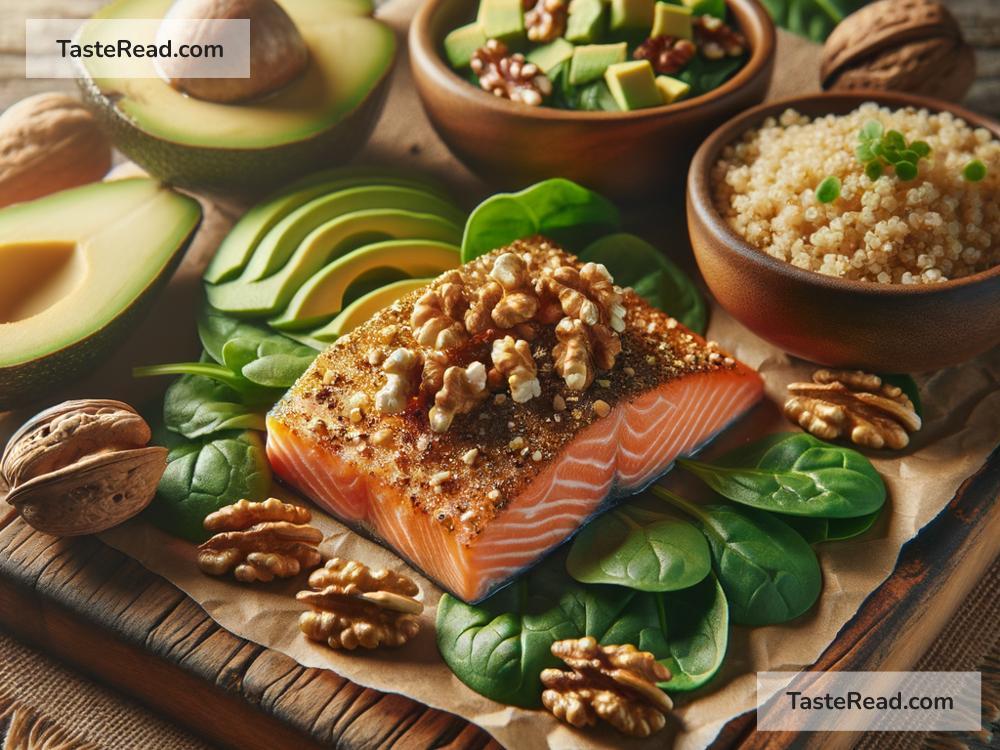Foods That Enhance Auditory Processing: Boosting Brain Health with Every Bite
Auditory processing refers to how the brain interprets sounds, including speech, music, and environmental noises. It’s not just about hearing the sound but understanding and making sense of it. For example, recognizing a friend’s voice over the phone or following instructions in a noisy classroom depends on auditory processing. Good auditory processing skills are essential for communication, learning, and everyday activities.
Did you know the foods you eat can play a significant role in improving brain health, including auditory processing? Your brain thrives on nourishment, and certain nutrients can enhance its ability to process sounds effectively. In this blog, we’ll explore the best foods for auditory processing and how they support brain health.
1. Omega-3 Fatty Acids: The Brain’s Superfood
Omega-3 fatty acids are essential fats that play a major role in brain development and function. They help improve communication between neurons, which is crucial for accurate auditory processing. Research suggests that omega-3s can enhance memory, focus, and even listening skills.
Best sources of omega-3:
– Fatty fish like salmon, mackerel, and sardines
– Walnuts
– Flaxseeds and chia seeds
– Algae-based supplements (for vegetarians)
Adding a piece of grilled salmon or sprinkling chia seeds on your oatmeal can help keep your brain sharp, allowing you to process sounds more efficiently.
2. Antioxidants: Protecting the Brain from Damage
Every day, our brain experiences stress from environmental toxins, poor diets, or lack of sleep. This stress can harm brain cells, including those involved in auditory processing. Antioxidants are powerful nutrients that protect the brain from damage and support healthy neural connections.
Best sources of antioxidants:
– Berries like blueberries, strawberries, and blackberries
– Green leafy vegetables like spinach and kale
– Dark chocolate (opt for 70% cocoa or higher)
– Nuts and seeds
For a snack, grab a handful of mixed berries or a piece of dark chocolate. These foods can boost auditory processing by keeping your brain resilient and healthy.
3. Magnesium: The Guardian of Neural Function
Magnesium is a mineral that plays a crucial role in regulating nerve signals. It’s especially helpful in reducing auditory fatigue, which occurs when the brain has difficulty processing sounds for long periods. Magnesium also protects against noise-induced hearing loss and helps the brain stay calm and focused.
Best sources of magnesium:
– Almonds, cashews, and peanuts
– Avocados
– Whole grains like brown rice and quinoa
– Beans and lentils
Consider making a hearty quinoa salad with avocado for lunch to give your brain the magnesium it needs for optimal auditory processing.
4. Vitamin B12: Supporting Cognitive Energy
Vitamin B12 is essential for maintaining healthy nerve cells, including those involved in auditory processing. This vitamin enhances focus, boosts memory, and ensures your brain has the energy it needs to interpret sounds effectively.
Best sources of Vitamin B12:
– Meat, poultry, and fish
– Eggs and dairy products like milk and cheese
– Fortified cereals and plant-based milks for vegetarians and vegans
A serving of scrambled eggs or grilled fish can help you get enough Vitamin B12 to support your auditory system and overall brain function.
5. Zinc: Enhancing Communication Between Brain Cells
Zinc is an important mineral for maintaining brain health and supporting communication between neurons. It’s been linked to improved attention and listening, both of which are critical for auditory processing. Zinc also helps your brain respond quickly to new information.
Best sources of zinc:
– Shellfish like oysters and crab
– Pumpkin seeds
– Chickpeas and lentils
– Beef and poultry
Pairing zinc-rich foods like grilled chicken with pumpkin seeds sprinkled on a salad can help fine-tune your auditory skills.
6. Whole Grains: Fueling Brain Function
Whole grains are packed with complex carbohydrates that provide a steady stream of energy to your brain. They also contain important vitamins, such as Vitamin E, that support overall cognitive function. When your brain has a stable energy supply, it can process information, including sounds, more effectively.
Best sources of whole grains:
– Oats
– Brown rice
– Barley
– Whole-grain bread and pasta
Start your day with a bowl of oatmeal topped with fresh berries to kickstart your brainpower and auditory processing.
7. Hydration: The Unsung Hero
While not technically a food, water is crucial for optimal brain function. Even mild dehydration can make it harder for your brain to process sounds and stay focused. Keeping hydrated helps nerve cells work efficiently and keeps your brain sharp.
Best ways to stay hydrated:
– Drink water regularly throughout the day
– Include water-rich foods like cucumbers and watermelon in your diet
– Avoid excessive caffeine or sugary drinks, which can dehydrate you
Carry a reusable water bottle to ensure you’re giving your brain the hydration it needs.
Final Thoughts: Nourishing Your Brain for Better Listening
The foods you eat play a significant role in enhancing auditory processing. Nutrient-rich foods, especially those containing omega-3s, antioxidants, magnesium, and vitamins like B12, can improve brain function and make it easier to interpret sounds. Adding these foods to your diet is not just good for your ears — it’s also great for your overall health.
Eating for better auditory processing doesn’t need to be complicated. Small changes, like incorporating more fatty fish, berries, whole grains, and leafy greens into your meals, can make a big difference. Whether you’re preparing for an important meeting, helping your child focus in school, or just trying to communicate better, nourishing your brain with these foods is a delicious way to reach your goals.
Good hearing is more than just listening — it’s understanding. So, eat smart, and let your brain process sounds like a symphony!


